




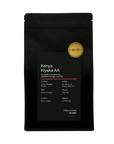
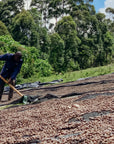
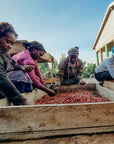
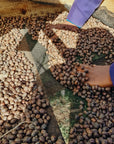
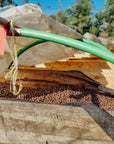
Kenya - Kiyaka AA
Producer: Edwin Nyaega Kiyaka
Farm: Kiyaka Estate
Location: Kisii County
Variety: SL28, SL34, Batian, Ruiru 11
Process: Natural
Altitude: 1,700 masl
| Fermentation |
▪▪▪▫▫ |
| Sweetness | ▪▪▪▪▫ |
| Acidity |
▪▪▪▫▫ |
| Roast | ▪▪▪▫▫ |
brewing guide
- Ready your brewing tools ahead.
- Keep your coffee gear and containers clean.
- Decide and adjust your grind size based on:
— Your coffee’s roast date
— Your brewing method
- Be consistent with water quality and measuring weight, ratios, and time.
- Remember!
— Let your palate help you personalize the best recipe for you.
— Brew often and have fun!
More about Brewing here.
